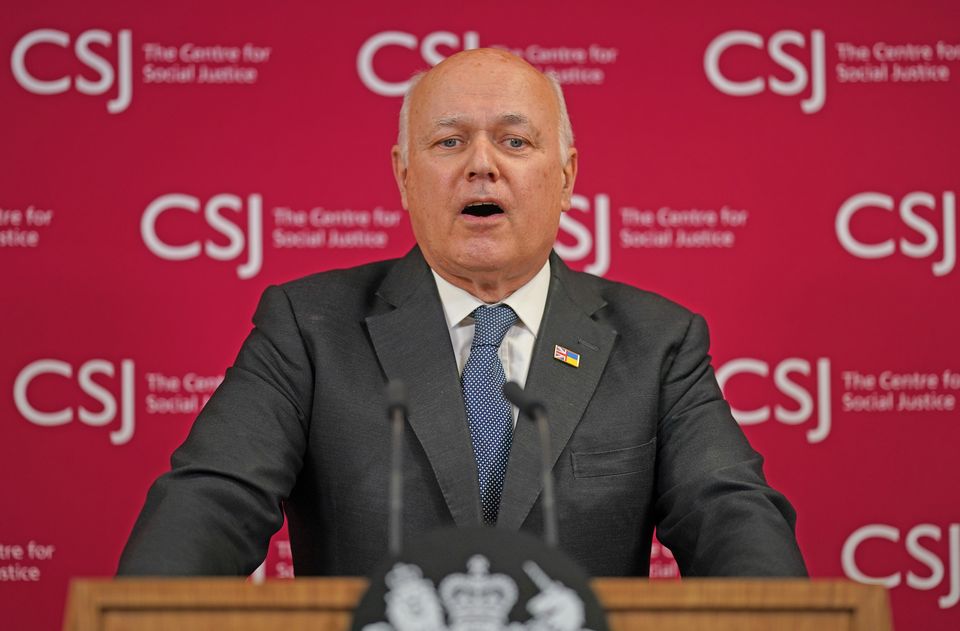Supermarkets found to have been selling products linked to slave labour are “complicit” in prioritising profits over human rights, a Labour MP has said.
This comes after the BBC found that tomato puree products labelled as “Italian” and sold in UK supermarkets appear to contain tomatoes grown and picked in China using forced labour.
Sarah Champion argued that UK supply chains are “awash with Uighur forced labour products” because human rights due diligence is “optional” for UK companies.
“To supermarkets, I say, all of you are complicit in putting profits above human rights and I hope the British public do the right thing and make their mark with their pocket, in their wallet,” she said.
Conservative former minister Sir Iain Duncan Smith called on the Government to make it a “criminal offence” for supply chains to have links to slave labour.
Business minister Douglas Alexander said the Government will be “reviewing” the impact of changes to supply chains in the US, Europe, Canada and Mexico to inform the UK’s future approach.
In an urgent question, the MP for Rotherham told the Commons: “Yesterday’s ‘blood on your shelves’ BBC investigation has rightly shocked the British public.
“Tomato products sold in UK supermarkets with labels informing British customers that purees were Italian made or produced in Italy were actually linked to slave labour in the Xinjiang autonomous Uighur region of China.
“Our weak and confusing product labelling has allowed a linguistic slight of hand to occur with, one can only assume, the aim of misleading consumers.
“So minister I have to push you, what more evidence is required to prove that we need stronger labelling standards that give consumers more information on the sourcing countries of pre-packed products?”
Conservative former minister Sir Iain Duncan Smith (Yui Mok/PA)
She added: “An estimated 700,000 are involved in the production of tomatoes against their will, the UN has reported forced labour, torture and abuse.
“Survivors of the tomato fields cite having to make impossible daily quotas with physical torture such as electrocution used as punishment for failing to use these targets.
“And yet tomato products through these barbaric practices are lining the shelves of our supermarkets, sold as if they were produced in a completely different country.”
Mr Alexander said: “The UK Government expects and supports UK businesses to undertake due diligence so that human rights and environmental issues are considered in their operations and supply chain relationships, in line with the OACD (Organisation for Economic Co-operation and Development) guidelines on responsible business conduct.”
He later added that he shares Ms Champion’s concerns and the company in question will be approached to “establish more clearly the exact facts”.
Mr Alexander also went on to say: “In the United States, in the European Union, in Canada and Mexico there has been introduced legislation, or in the process of introducing legislation, specifically for import bans, to prevent such goods from entering their markets in the first place.
“And I can assure (Ms Champion) we are reviewing the impact of these measures to help inform what should be the UK’s approach.”
Sir Iain, MP for Chingford and Woodford Green, argued that the Modern Slavery Act is “long passed its sell-by date”.
He added: “Will we now move to checking all supply chains and putting legislation in place to make it a criminal offence to have anything to do with slave labour?”
Mr Alexander said the current legislation is “clear as to the mandatory obligations existing presently under companies”.
Conservative former minister and home affairs committee chairwoman, Dame Karen Bradley called for “regulation that would put the onus on the importer to prove that there was no forced labour within the product before they were ever allowed to even enter the UK supply chain, as we have in the US”.
Mr Alexander said: “We are considering what other elements of legislation are relevant to the work of the Modern Slavery Act, as it is presently constituted.”
Conservative MP Sir Julian Lewis (New Forest East) said: “Isn’t the root of the problem the fact that successive British governments from David Cameron onwards have been willing to cuddle and cosy up to a communist totalitarian state whilst trying to preserve some pretence of distancing themselves from direct human rights abuses?
“In reality, isn’t it the case that as long as we try to have major economic relations with a totalitarian state, it will always be possible for that state to divert the slave labour to its domestic economy and export the other products to us? So it’s only really a fig leaf isn’t it?”
Mr Alexander replied: “He will find no disagreement on this side of the House in calling out the disastrous foreign policy mistakes of the former member for Witney, we seem to have ended up with the worst of both worlds in relation to China.”
He added that the Government will “recognise frankly the complexity of the bilateral relationship, the fact that there are significant trade dependencies, there are significant geopolitical challenges”.
Shadow business minister Dame Harriett Baldwin said: “In its so far unsuccessful mission to grow the UK economy, will the minister agree that that growth must not come at the price of restricting our condemnation of human rights abuses in China?”
Mr Alexander replied: “The Government stands firm on human rights including on Xinjiang, where China continues to persecute and arbitrarily detain Uighurs, and other predominantly Muslim minorities.”
